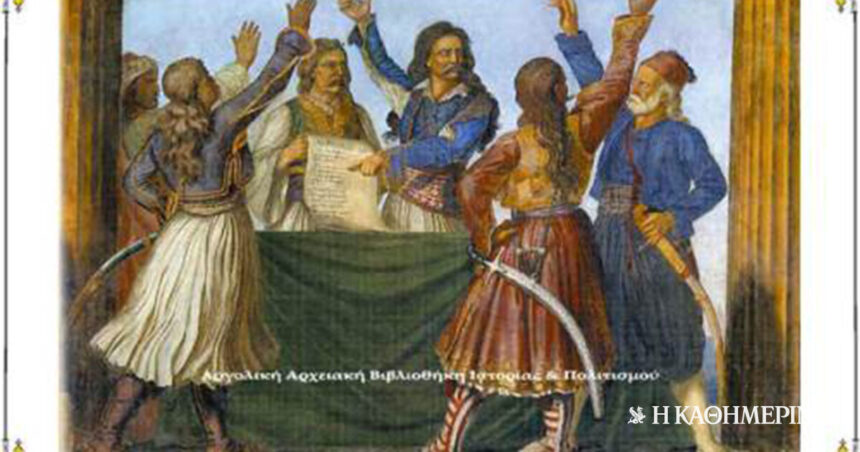On New Year’s Day 1822, about 18 kilometers from the ancient theater of Epidaurus in revolutionary Greece, the First National Assembly votes for the first Greek Constitution. Not wanting to provoke the Holy Alliance which was then suppressing the liberal revolutions in the Old Continent, he calls it the “Provisional Government of Greece”.
The Assembly consisted of representatives (“proxies”) from the Peloponnese, Central Greece and some islands. Consisting of 110 short paragraphs, which – according to the French model – were subdivided into “titles” and “sections”, the Constitution began as follows:
“In the name of the Holy and Undivided Trinity. The Greek Nation, under the horrible Ottoman Dynasty, unable to bear the heaviest and unexampled yoke of tyranny, and they avoided it with a great sacrifice, preaches today through its legal Representatives, in a National Assembly, before God and men, “The Political of this Existence and Independence” in Epidaurus, on the first of January, year ᾳokv, and the first of Independence”.
Then, he defines the Greek nation as those “indigenous inhabitants of the territory of Greece who believe in Christ”, but also those who “come from outside, live or settle in the territory of Greece” and “have the desire to become Greeks”. All Greeks are equal to each other, “they enjoy all political rights without any difference”, “they are equal before the laws without exception, or rank, or class, or position” and the heterochthonous “are equal to the indigenous inhabitants before the Laws”. Apart from equality, the Constitution declares that “the property, honor and security of every Greek is under the protection of the Laws”, establishes tax equality, prohibits torture, the penalty of confiscation and arrest without a court warrant.
In its first article, the Constitution makes the “Eastern Orthodox Church of Christ” “dominant”, but ensures tolerance towards all religions. In the annex, Corinth is designated as the first, temporary administrative capital, Athena is established as a symbol on state seals, and blue and white are established as the colors of the flag. The new Greek state formation “should in every way take care of the widows and orphans of those killed in the pro-patriotic war”.
Also, the Constitution of 1822 establishes the representative principle, as well as the principle of separation of powers. In this context, the political power of the state (the “Administration”) consisted of two bodies, the “Parliamentary” and the “Executive”. The respective responsibilities were exercised by two collective bodies with a single term of office, which balanced each other in the legislative process. The judiciary (the “Dikasticon”) was an independent eleven-member body. In fact, courts (“criteria”) of three degrees were established as well as magistrates’ courts.
The five-member Executive played the role of directorate and was responsible for forming the eight-member government (in parenthesis the first Greek ministers): chief secretary of the Territory, i.e. president of the cabinet and minister of foreign affairs (Theodoros Negris), minister of the interior (Ioannis Kolettis), minister of the economy (Panoutsos Notaras), Minister of Law (Theodoros Vlasios), Minister of Defense (Notis Botsaris), Minister of the Navy (a three-member body with representatives from Hydra, Spetses and Psara), Minister of Religion (Josif, Bishop of Androusis) and Minister of Police (Lambros Nakos). On January 15, Alexandros Mavrokordatos (who also presided over the National Assembly) was elected as the first president of the Executive, and soon after the members of the first government.
The then 13-year-old Nikolaos Dragoumis describes: “[…] The four survivors recount that tears flowed from everyone’s eyes, and as on the day of the Resurrection there were retaliatory spasms”. Thus, since 1822 the Greeks, beyond their national independence, have been fighting for the political freedom established and protected by this first Constitution.
Column editor: Myrto Katsigera, Vassilis Minakakis, Antigoni-Despina Poimenidou, Athanasios Syroplakis




